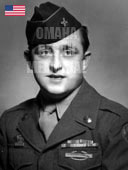| Plan a trip : |  |
| |
|
 |
Raymond S. HOBACK - 29th Division.
Bedford Boys Fallen - Raymond Samuel HOBACK never had a chance to reach 100 years old today. Instead, he sacrified his life for our freedom... Raymond may have made it out of his landing craft, but he never made it to shore. Others recall seeing his body in the water. Bedford also failed to make in on the beach. He was killed by an exploding 88mm shell. Their time in the battle could be measured in minutes... [American D-Day facebook] Read more...
[Posted: 2020-01-21 22:40:05]
Bedford Boys Fallen - Raymond Samuel HOBACK never had a chance to reach 100 years old today. Instead, he sacrified his life for our freedom... Raymond may have made it out of his landing craft, but he never made it to shore. Others recall seeing his body in the water. Bedford also failed to make in on the beach. He was killed by an exploding 88mm shell. Their time in the battle could be measured in minutes... [American D-Day facebook] Read more...
[Posted: 2020-01-21 22:40:05]
RIP - Robert GIGUERE - Navy.
It is with heavy heart we learn the passing of Mr. Robert GIGUERE, a veteran of D-Day (Normandy)... He was 93... Four days earlier, Giguere rode across the choppy English Channel toward the Normandy coast with the Sixth Naval Beach Battalion. When his carrier grounded on the beach, a Teller mine detonated from beneath and tore through the ship's hull, Killing several soldiers below deck... [American D-Day facebook] Read more...
[Posted: 2020-01-21 22:58:23]
It is with heavy heart we learn the passing of Mr. Robert GIGUERE, a veteran of D-Day (Normandy)... He was 93... Four days earlier, Giguere rode across the choppy English Channel toward the Normandy coast with the Sixth Naval Beach Battalion. When his carrier grounded on the beach, a Teller mine detonated from beneath and tore through the ship's hull, Killing several soldiers below deck... [American D-Day facebook] Read more...
[Posted: 2020-01-21 22:58:23]
| 1 - 2 / 25 news |
| BRODISH WILLIAM J 27TH ORD BOMB DISP SQ |
Honored by Constance Brodish
[Posted: 2024-06-12 20:46:41]
| MULVEY JOHN M 299TH ENG COMBAT BN |
Honored by Diane Mulvey
[Posted: 2024-06-06 18:50:12]
| 1 - 2 / 138 messages |
| OMAHA BEACH MEMORIAL - TESTIMONIES | |
 |
Partager |
| Private George E. Burr 29th Infantry Division 116th Infantry Regiment 3rd Battalion Company M |
|
We waited in staging areas and continued to train in England on a place with lots of wet ground. (This was where an English prison was which I think was called Dartmouth prison.) The night before the landing we all met with our priest, or chaplain, and said prayers and received communion. On the way to the beach, men were mostly quiet – keeping thoughts to themselves. I prayed and thought about my home and my family. I asked God to keep watch over me. As we landed on Omaha Beach, I was in line to be the third man off of the boat. My Technical Sergeant, Melvin Taylor, told us all "there are only two kinds of men on the beach, dead men and men who want to die. So, get off the beach as soon as possible". I ran as fast as I could up the hill to where we would meet. My friend, Chick Evans, was right with me, when a rifle bullet from a German sharpshooter hit him. (They were trying to pick off men who carried heavy weapons.) He passed away there. We advanced as far as we could. Lieutenant Thomas was leading us. We regrouped. I was carrying a range finder at the time. On our first night we dug in at the top of the hill. We all were in foxholes (we had each dug our own). The machine gunners put the machine guns in place. We were around the whole hedgerow when we dug in. I sleep as much as I could. Officers got rid of their bars and distinguishing marks because the Germans were looking for officers and automatic weapons – machine guns and BAR (rifle). If you had a BAR – you were a marked man! We were on a hillside and watched the boats coming in. They kept bringing in more soldiers. Some of the men were searching for booby traps and mines. Each day we went in as far as we could, dug in and spent the night in a hole again. We put guys around the edge of where we were in case someone tried to attack. Getting to St. Lô was tough. We lost our major, Major Howie, there the day before we reached there. Hard fighting. When I got hit, we were trying to get as much ground as possible each day. I was hit 11 days later by either an 88 shell or a mortar just outside of St. Lô. Our Major Howie was killed there and they carried his body into the town because the night before he said that he wanted to get to St. Lô. After I was hit, they put two of us on the front of a jeep, then we went a little farther and they put us into an ambulance with two other soldiers that I did not know. I was brought to a hospital on the beach, where they amputated some of my left hand. Then they sent me to a hospital for other surgeries. I met a Sergeant Moore in the hospital - he was in the mortar platoon of our company. Eventually I made it back to England on a hospital ship - I think it was the Blanche F. Sigmund hospital ship. They asked me where I wanted to go in the states. I said the closest hospital to home inC onnecticut. They sent me to Framingham, Massachusetts to Cushing General. I was discharged on December 24, 1944. Posted: March 3, 2009 Copyright: Laurent Lefebvre |
|

